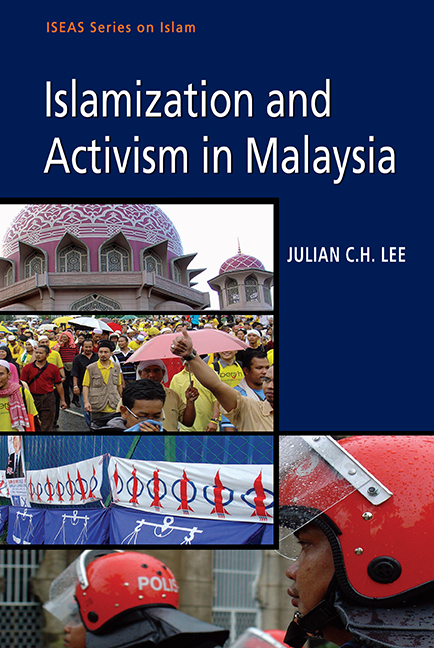Book contents
- Frontmatter
- Dedication
- Contents
- Acknowledgements
- Abbreviations
- Introduction
- 1 On Islam, Democracy, and Activism
- 2 A Short History of Malaysia
- 3 Malaysia as an Islamic State: The Debate
- 4 Conflict of Jurisdiction: Civil versus Syariah Law
- 5 Islamist Lawyers’ Views
- 6 Social Activism and the Article 11 Coalition
- 7 Questioning Orthodoxies, Criticizing Zealotry
- 8 Electoral Engagements
- Conclusion: Islam, Democracy, and Activism in Malaysia
- Bibliography
- Index
- About the Author
- Plate section
3 - Malaysia as an Islamic State: The Debate
Published online by Cambridge University Press: 21 October 2015
- Frontmatter
- Dedication
- Contents
- Acknowledgements
- Abbreviations
- Introduction
- 1 On Islam, Democracy, and Activism
- 2 A Short History of Malaysia
- 3 Malaysia as an Islamic State: The Debate
- 4 Conflict of Jurisdiction: Civil versus Syariah Law
- 5 Islamist Lawyers’ Views
- 6 Social Activism and the Article 11 Coalition
- 7 Questioning Orthodoxies, Criticizing Zealotry
- 8 Electoral Engagements
- Conclusion: Islam, Democracy, and Activism in Malaysia
- Bibliography
- Index
- About the Author
- Plate section
Summary
Of the arguments in the Islamic state debate that I explore in this chapter, first are those that should be regarded as emanating from UMNO and the Islamization mechanisms that it has established. Among these arguments are that existing political structures are in some way already Islamic or consistent with Islam and that Malaysia ought to undergo a process of further Islamization.
Second, I examine the approach of liberal constitutionalists who interpret Malaysia's Constitution as being fundamentally liberal and not suggestive of an Islamic state. As an exemplar of this approach I take the position articulated by lawyer Malik Imtiaz Sarwar who directly refutes the government position. Third, I turn to PAS. PAS wishes to turn Malaysia into an Islamic state and disputes UMNO's assertion that Malaysia already is.
One point of interest in these three perspectives is the different historical groundings employed to legitimize the different positions. UMNO's salient historical foundation is the imagined history of the Malaysian peninsula in which Islamic law prevailed prior to both colonialism and the immigration of Chinese and Indian migrants. The temporal precedence of the Malays also forms a key historical justification for UMNO's arguments that Malaysia is an Islamic state and ought to be regarded as such. For liberal constitutionalists, the salient historical foundation is the creation of Malaysia's Constitution which embodies and articulates The Bargain. The Constitution is regarded as essentially liberal and forms the legitimate contemporary legal and political framework by which personal liberties and freedoms should be reckoned. For PAS, on the other hand, the salient historical foundation is Medina under the leadership of the Prophet Muhammad. The constitution of Medina which was created by Muhammad forms a model for PAS as it was multi-religious and multi-ethnic like Malaysia is today. However, although its salient historical model is the oldest of the three, PAS's vision is forward-looking in that it is less interested in interpreting the current Constitution or restoring Malaysia's past, but seeks to posit a completely new Constitution for Malaysia. Instead of the 1957 Constitution, the primary sources of legislation for PAS are to be the Quran and the Sunnah (traditions of the Prophet).
THE PERSPECTIVE OF UMNO
On 29 September 2001, Mahathir Mohamad announced that Malaysia was already an Islamic state at the Annual General Assembly of the ostensibly multi-ethnic but Chinese-dominated BN component party, Gerakan.
- Type
- Chapter
- Information
- Islamization and Activism in Malaysia , pp. 51 - 61Publisher: ISEAS–Yusof Ishak InstitutePrint publication year: 2010

